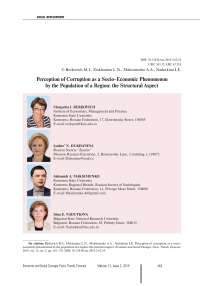Perception of corruption as a socio-economic phenomenon by the population of a region: the structural aspect
Автор: Berkovich Margarita I., Dukhanina Lyubov N., Maksimenko Aleksandr A., Nadutkina Irina E.
Журнал: Economic and Social Changes: Facts, Trends, Forecast @volnc-esc-en
Рубрика: Social development
Статья в выпуске: 2 (62) т.12, 2019 года.
Бесплатный доступ
The article presents an experience of a structured study of a special socio-economic phenomenon-corruption - in the aspect of its perception by different groups of population of a region. The study was conducted by Kostroma regional branch of the Russian Society of Sociologists in several stages: civil servants of the Kostroma Oblast Administration were interviewed in 2015, an online survey of university graduates of the city of Kostroma was conducted in November 2016, and finally, surveys of representatives of the business community1 of the Kostroma Oblast were conducted in 2017. The goal of the survey was to assess the perception of corruption as a socio-economic phenomenon; the assessment was carried out through analyzing and interpreting the data obtained in the course of the surveys on the following topics: assessment of the level of corruption in general, perception of the level and dynamics of corruption, and possible ways to overcome corruption, according to respondents. Having interpreted the results of the survey we reveal the attitude of different target audiences toward the understanding of the phenomenon of corruption, its causes, and ways to combat it. In the context of the decree of Russian President Vladimir Putin “On the national anti-corruption plan for 2018-2020” signed June 29, 2018, the data we have obtained become particularly relevant for the development of sociological research techniques to assess the level of corruption in constituent entities of the Russian Federation (Section I, Paragraph 1, Letter “a”) and to conduct scientific interdisciplinary studies, the results of which can be used to prepare proposals aimed to enhance anti-corruption measures and increase the efficiency of such measures in the business sector (Section V, Paragraph 21, Letter “b”).
Erception of the level of corruption, combating corruption, structural analysis, prevalence of corruption manifestations
Короткий адрес: https://sciup.org/147224161
IDR: 147224161 | DOI: 10.15838/esc.2019.2.62.10
Список литературы Perception of corruption as a socio-economic phenomenon by the population of a region: the structural aspect
- Gatsko M.F. The scale and dynamics of corruption in the Russian Federation. Nauka i sovremennost'=Science and Modernity, 2015, no. 1(3), pp. 103-119. (In Russian).
- Golik Yu.V., Karasev V.I. Korruptsiya kak mekhanizm sotsial'noi degradatsii [Corruption as a Mechanism of Social Degradation]. Saint Petersburg: Yuridicheskii tsentr Press, 2005. 329 p.
- Men'shenina N.N. (Ed.). Korruptsiya v Rossiiskoi Federatsii: genezis, formy, tekhnologii, protivodeistvie [Corruption in Russia: Genesis, Forms, Techniques, Combat]. Yekaterinburg: Izd-vo Ural. un-ta, 2014. 202 p.
- Rossiiskaya korruptsiya: uroven', struktura, dinamika: opyt sotsiologicheskogo analiza [Corruption in Russia: Level, Structure, Performance: Sociological Analysis]. Moscow: Fond «Liberal'naya missiya», 2013. 754 p.
- Zhuravlev A.L., Kitova D.A., Sosnin V.A. (Eds.). Sotsial'no-psikhologicheskie issledovaniya korruptsii [The Socio-psychological Research into Corruption]. Moscow: Institut psikhologii RAN, 2017. 285 p.
- Pozdnyakov V.P. Corruption in education: moral, psychological and legal aspects. Prikladnaya yuridicheskaya psikhologiya=Applied Legal Psychology, 2012, no. 2, pp. 3-20. (In Russian).
- Kabanov P.A. Anti-corruption education in Russia's constituent entities: experience of legal regulation of organization and development prospects. NB: Administrativnoe pravo i praktika administrirovaniya=NB: Administrative Law and Administration Practice, 2016, no. 4, pp. 35-55. (In Russian).
- Armantier O., Boly A. A controlled field experiment on corruption. European Economic Review, 2011, no. 55 (8), pp. 1072-1082.
- Barr A., Serra D. Corruption and culture: an experimental analysis. Journal of Public Economics, 2010, no. 94, pp. 862-869.
- Cameron L. et al. Propensities to engage in and punish corrupt behavior: experimental evidence from Australia, India, Indonesia and Singapore. Journal of Public Economics, 2009, no. 93, pp. 843-851.
- Drugov M., Hamman J., Serra D. Intermediaries in corruption: an experiment. Experimental Economics, 2013.
- Frank B., Schulze G.G. Does economics make citizens corrupt? Journal of Economic Behavior and Organization, 2000, no. 43, pp. 101-113.
- Granovetter M. The Social Construction of Corruption. Stanford: Stanford University Press, 2007.
- Lambsdorff J.G. The Institutional Economics of Corruption and Reform: Theory, Evidence and Policy. Cambridge: Cambridge University Press, 2007.
- A.I. Dolgova (Ed.). Korruptsiya: sostoyanie protivodeistviya i napravleniya optimizatsii bor'by [Corruption: Counteraction and Optimization of Anti-Corruption Methods]. Moscow: Rossiiskaya kriminologicheskaya assotsiatsiya, 2015. 361 p.
- Klyukovskaya I.N. Korruptsiya kak faktor organizovannoi prestupnosti v sfere torgovli lyud'mi (monografiya) [Corruption as a Factor in Organized Crime in Human Trafficking (monograph)]. Stavropol', 2012.
- Luneev V.V. (Ed.). Korruptsiya: politicheskie, ekonomicheskie, organizatsionnye i pravovye problemy [Corruption: Political, Economic, Organizational and Legal Issues]. Moscow: Yurist", 2001. 426 p.
- Shul'ga V.I. Corruption in Modern Russian Statistics. Territoriya novykh vozmozhnostei. Vestnik Vladivostokskogo gosudarstvennogo universiteta ekonomiki i servisa=Territory of New Opportunities. Bulletin of Vladivostok State University of Economics and Service, 2015, no. 1, pp. 36-42. (In Russian).
- Bragina Z.V., Maksimenko A.A., Timonin A.Yu. Perception of Corruption by State and Municipal Officials. Vestnik ekonomiki, prava i sotsiologii=The Review of Economy, the Law and Sociology, 2017, no. 3, pp. 126-129. (In Russian).
- Afaunov A.Z. Sotsiostrukturnyi analiz otnosheniya rossiiskoi molodezhi k korruptsii [The Socio-structural Analysis of Young People's Attitudes to Corruption in Russia]. Krasnodar, 2016. 207 p.


